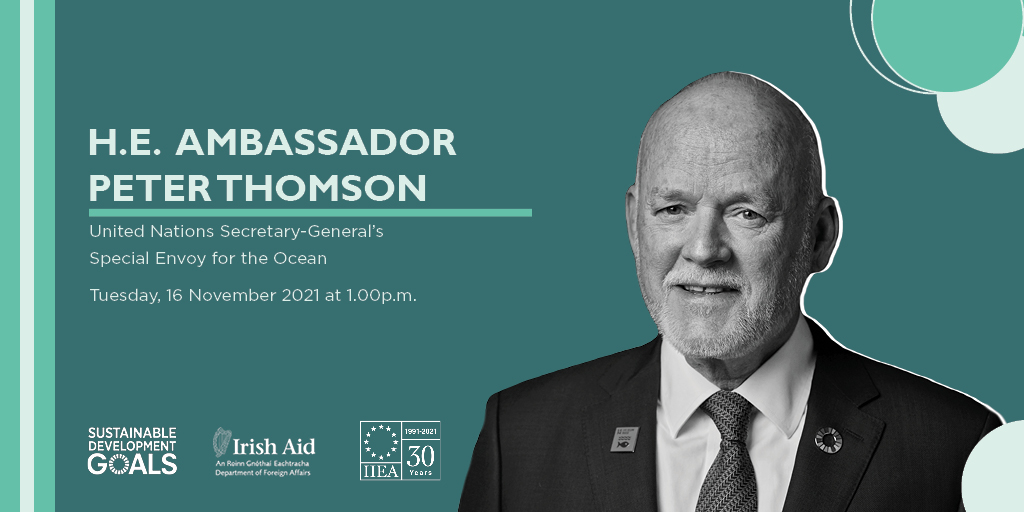The Ocean and Small Island Developing States

Author: Stephen Frain
Introduction
In the seventh webinar of the Development Matters lecture series, which is supported by Irish Aid, the IIEA welcomed Ambassador Peter Thomson to discuss the ocean and Small Island Developing States (SIDS). Ambassador Thomson is the United Nations Secretary-General’s Special Envoy for the Ocean. In his address to the Institute, he underscored the importance of the sustainable blue economy for the SIDS in the context of achieving Sustainable Development Goal (SDG) 14 (Life Below Water). He also reflected on opportunities for Ireland to act as a catalyst for ‘ocean action’. This blog will explore the key themes of Ambassador Thomson’s address.
In his opening remarks, Irish Aid Director-General, Ruairí de Búrca, emphasised the importance of oceans for Ireland through both the lens of climate change and of biodiversity preservation. He noted Ireland’s work on these matters through its own Strategy for Partnership with Small Island Developing States and highlighted that Ireland is one of the only countries in the world to have developed a bespoke strategy for its partnership with the SIDS.
Sustainable Development Goal 14 (Life Below Water)
SDG 14 refers to the conservation and sustainable use of the oceans, seas and the marine environment and is a key element of the UN sustainability framework to ensure a sustainable future for the oceans and for the SIDS. In his address, Ambassador Thomson acknowledged that a lot has been achieved in respect of SDG 14, but that much more work remains to be done.
The Sustainable Blue Economy
Ambassador Thomson highlighted that the sustainable blue economy is a vital element of SDG 14. The sustainable blue economy refers to the sustainable use of ocean resources for economic growth, improved livelihoods, and jobs while preserving the health of the ocean ecosystem. The potential of the sustainable blue economy is vast, and encompasses sustainable aquaculture, offshore wind energy, tidal energy, and other ocean technologies. It has a heightened importance in the context of the SIDS as they are the countries that rely on the ocean the most economically and are most affected by the deterioration of the ocean’s health.
The Path Forward: Ocean Diplomacy
The oceanic challenges faced by SIDS have become, as Ambassador Thomson acknowledged, an increasingly important issue on the international agenda. Discussions on SDG 14 formed a significant part of the recent COP26 summit in Glasgow and ultimately, reference to the need to maintain viable and healthy ocean systems was included in the final text – the Glasgow Climate Pact. However further leadership on this front is necessary to sustain momentum. Ambassador Thomson highlighted a number of international major conferences which are expected to significantly influence the trajectory towards achieving SDG 14. In this respect, he looked forward to the prospect of further support for SDG 14 at the forthcoming One Ocean Summit which will take place in Brest, France in early 2022 and the Our Ocean Conference, which will take place in Palau in 2022 the second phase of the COP15 (Conference of the Parties to the Convention on Biological Diversity) in Kunming and the UN Ocean Conference in Lisbon. Marine protection in the high-seas and their enforcement is a critical priority of SDG14 and one which Ambassador Thomson emphasised in his remarks.
Climate Finance and Small Island Developing States
Another major avenue for ocean action is climate finance. With respect to climate finance, Ambassador Thomson posited that “the needle is moving in the right direction” and that continued development in this respect will have profound effects for the viability of a sustainable blue economy. Moreover, increased climate finance, he argued, will have a significant impact on SIDS, in particular. At the recent COP26 summit in Glasgow, Ireland chose to focus on this area. the Minister for Foreign Affairs, Simon Coveney T.D., announced Irish Aid funding of €2.1 million to address the impacts of climate change on Small Island Developing States.
Implications for Ireland
Ireland’s intensified efforts to protect the oceans are expected to have significant implications for its development agenda and its partnership with the SIDS. Sustainable management of the ocean and the development of a new oceans funding initiative to explore the potential of the blue economy were objectives established by the Irish Government in its A Better World strategy. Moreover, deepening Ireland’s partnership with SIDS in this context is a foundational pillar of Strategy for Partnership with Small Island Developing States. In this strategy, the sustainable blue economy was a major focus and particular attention was given to the Caribbean region.
Conclusions
Ambassador Thomson concluded his remarks by emphasising that the achievement of the SDG 14 did not just have implications for the oceans, nor just for the SIDS, but for the world as a whole and as its future generations. Recent reports from the Intergovernmental Panel on Climate Change and the World Meteorological Organisation, Ambassador Thomson stressed, should serve as stark reminders to us all that sustainable ocean management and SDG 14 matter to us all.
